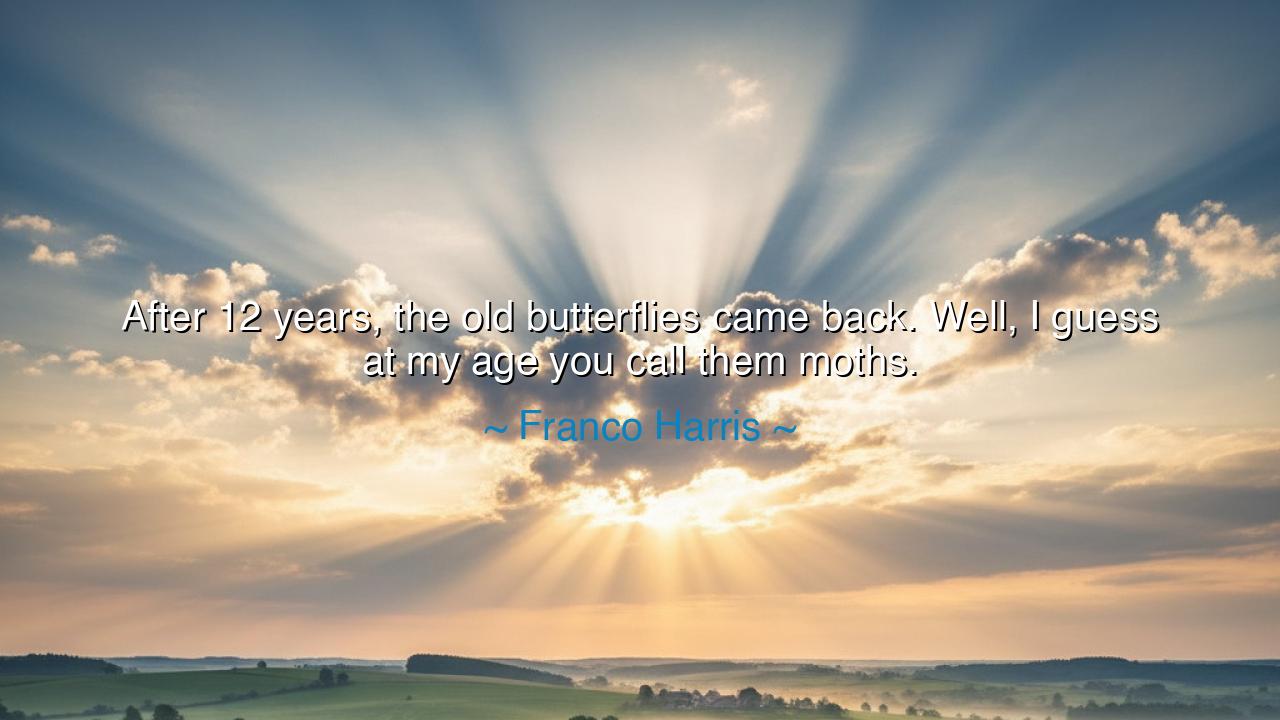
After 12 years, the old butterflies came back. Well, I guess at
After 12 years, the old butterflies came back. Well, I guess at my age you call them moths.






In the course of human existence, there are moments when the soul stirs with a familiar energy, an old feeling that resurfaces after years of slumber. Franco Harris, in his reflection on the return of his youthful nerves, captures this phenomenon with a poignant and self-deprecating smile: "After 12 years, the old butterflies came back. Well, I guess at my age you call them moths." In this simple statement, he reveals the enduring power of emotion and memory, how certain moments in life can bring back feelings of nervousness, excitement, and anticipation, even when time has passed. The butterflies of youth may become moths with age, but the core of human emotion—the feelings of vulnerability and anticipation—remain unchanged, lingering beneath the surface.
The ancients often spoke of the unwavering nature of the human spirit, despite the passage of time. Homer, in his epic works, portrayed heroes whose hearts were filled with fear and courage in equal measure, regardless of the battle or time that passed. Achilles, though a great warrior, faced his own struggles with self-doubt and uncertainty, even as he sought to conquer his enemies. Much like Franco Harris, who, after 12 years, still felt the nervousness of his early days, the ancient heroes were driven by a passion that transcended the years. The human condition, whether in the heat of battle or in the quiet moments of reflection, has always been one of deep emotion—a dance between fear and courage, doubt and confidence.
Consider the story of Cicero, the Roman statesman and philosopher, who, despite his towering achievements, often spoke of his own anxiety before delivering speeches in the Senate. Cicero, who was renowned for his eloquence, acknowledged that even after years of practice and recognition, the nervousness of speaking in public remained a constant companion. His own reflection, much like Harris’, reveals that nervousness is not a sign of weakness, but rather a reflection of our humanity—our desire to perform well, to rise to the occasion, and to prove ourselves. The butterflies may become moths with age, but the core emotions remain the same, serving as a reminder of the challenges and joys that come with growth and experience.
In the case of Franco Harris, who was celebrated for his legendary football career, the return of these butterflies, even in his later years, speaks to something deeper than nervousness or excitement. It represents the eternal fire of the human spirit, the desire to rise to the occasion no matter the years that have passed. When Harris said that the butterflies had transformed into moths, he acknowledged the inevitable changes that come with age: the physical challenges, the slowing of the body, the diminishing of youth’s strength. Yet, his words also suggest that these changes do not diminish the passion and determination that burn within us. Even as the moths of age flutter around us, we still carry the same drive, the same ambition, the same desire to succeed, to perform, and to overcome.
The story of Michael Jordan, whose return to basketball after retirement showed the world his enduring drive, mirrors Harris’ sentiments. Even in his later years, when his physical capabilities had diminished, Jordan still felt the stirrings of the old butterflies. The moths of his age did not dim his desire to compete, nor did they take away the excitement and energy he felt when he stepped onto the court. His legacy wasn’t defined solely by his physical prowess but by his unwavering desire to prove himself, to meet the challenges before him, and to perform at the highest level, even in his later years.
The lesson in Harris' words is one of resilience and acceptance—that the emotions that accompany youth are not erased by the passing of years. They may evolve, yes, but the passion, the drive, the nervousness that fuels us is part of what makes us truly alive. Just as Harris embraces the return of his butterflies, we too are reminded that our emotions—whether in youth or in old age—are not weaknesses but sources of strength. The moths of age are not symbols of defeat but of wisdom earned, of battles fought, and of the ongoing pursuit of excellence.
Therefore, let us take Franco Harris’ reflection as a guide for our own lives. Let us not fear the butterflies that come with new challenges, but instead, embrace them as signs of our vitality. Let us accept the passage of time, knowing that the moths may come, but they carry with them the wisdom of the years. Whether in our youth or in our later years, the flame of ambition and passion never truly fades; it simply evolves into something deeper, more refined, and more determined. Let us live, then, with the same fire that burned in our youth, carrying it forward with the wisdom and grace that comes with age.






AAdministratorAdministrator
Welcome, honored guests. Please leave a comment, we will respond soon